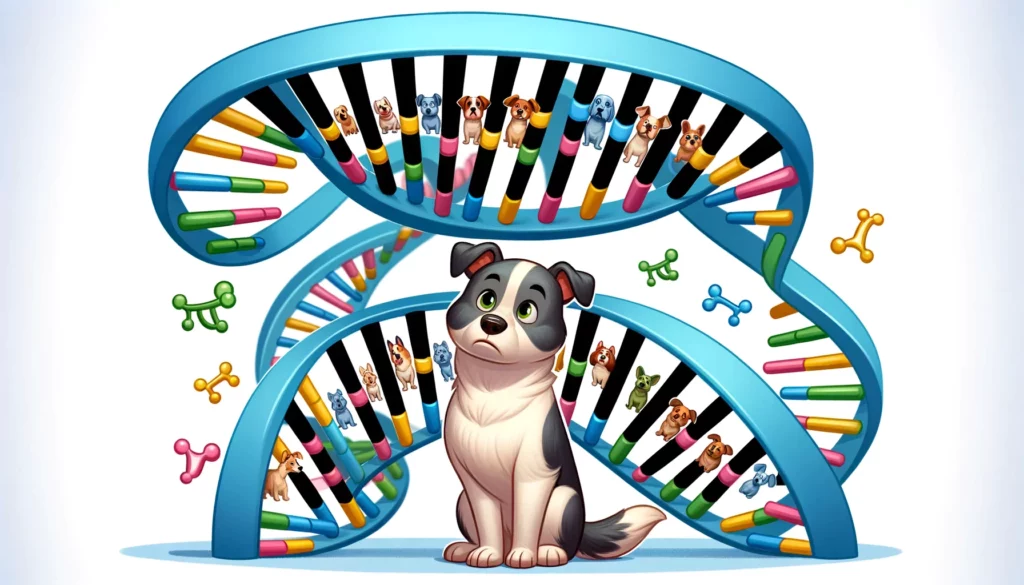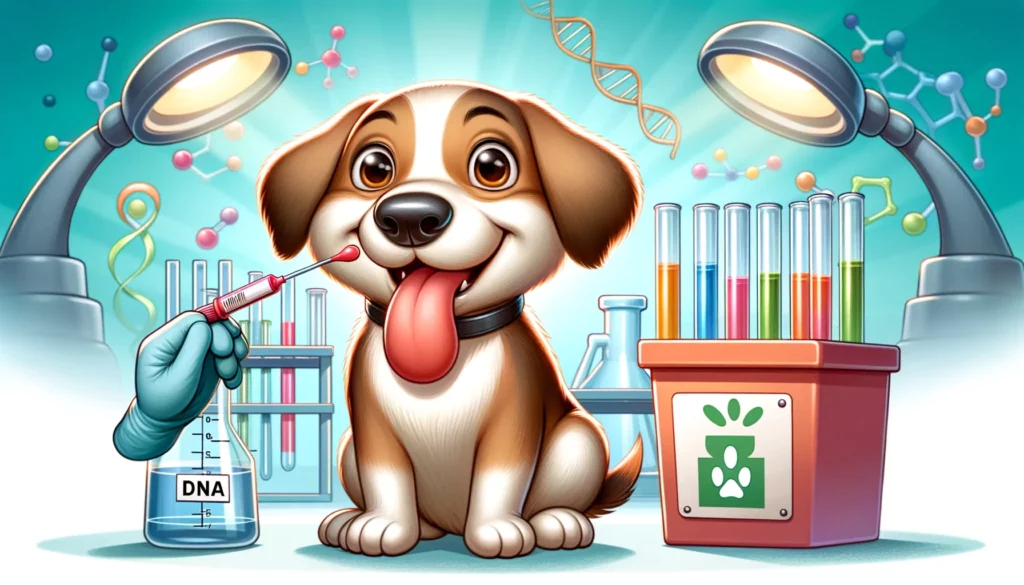Ancestry DNA testing has become increasingly popular for humans, offering insights into genetic heritage, health risks, and more. But did you know that similar tests are now available for our canine companions? Ancestry DNA for dogs is a fascinating and useful tool for pet owners who want to learn more about their furry friends’ genetic makeup.
In this comprehensive guide, we will explore what exactly ancestry DNA for dogs is, how it works, and the steps to take before and during the testing process. We will delve into the valuable information that these tests can provide, such as breed composition, health risks, and genetic age. We will also discuss the benefits of utilizing ancestry DNA for dogs, including identifying potential health risks, understanding behavior and traits, and connecting with other dog owners.
It’s essential to be aware of the limitations of these tests, such as the accuracy of results, the limited breed database, and privacy concerns. We will provide insights on how to choose the right ancestry DNA test for your dog. Join us as we uncover the exciting world of ancestry DNA testing for dogs and learn how it can benefit both you and your furry companion.
Key Takeaways:
- Discover your dog’s unique breed composition and genetic age with Ancestry DNA for Dogs.
- Gain insight into potential health risks and behavior traits of your dog through DNA testing.
- Connect with other dog owners and find out more about your furry friend’s ancestry with Ancestry DNA for Dogs.
| Aspect | Details |
|---|---|
| What is Ancestry DNA for Dogs? | A genetic testing service that provides insights into a dog’s ancestry, breed composition, and potential health risks. |
| How It Works | Involves collecting a dog’s saliva or cheek cells, sending it to a lab for DNA analysis, and comparing the results with a database of known dog breeds and genetic markers. |
| Benefits | Identifies breed composition, potential health risks, and genetic traits. Helps in understanding a dog’s behavior and traits. Enables connections with other dog owners. |
| Steps Before Testing | Ensure a clean environment to prevent DNA sample contamination. |
| Steps During Testing | Collect high-quality DNA samples using sterile swabs or blood samples. |
| What It Can Tell You | Breed composition, genotype, potential hereditary diseases, and genetic age. |
| Health Risks Identification | Uncovers potential health risks associated with specific breeds. |
| Genetic Age | Provides insights into a dog’s genetic age, which may differ from its chronological age. |
| Limitations | Accuracy concerns due to limited breed database and privacy issues related to genetic data sharing. |
| Choosing the Right Test | Consider health-related genetic markers and the reputation of the testing service. |
What Is Ancestry DNA for Dogs?
Ancestry DNA for Dogs is a genetic testing service that provides insights into the ancestry, breed composition, and potential health risks of a canine companion through advanced DNA analysis conducted by specialized laboratories such as Canine Genetics Laboratory.
This innovative approach to understanding a dog’s genetic makeup allows pet owners to uncover the unique mix of breeds that make up their furry friend. By leveraging genetic science, Ancestry DNA for Dogs not only reveals the ancestry of a dog but also identifies potential health risks associated with specific genetic markers, enabling proactive preventive care.

How Does Ancestry DNA for Dogs Work?
Ancestry DNA for Dogs operates by utilizing genetic testing methods to analyze a dog’s DNA, identifying unique genetic markers and traits associated with specific breeds, enabling pet owners to gain comprehensive insights into their dog’s genetic composition and lineage.
This offers invaluable information about a dog’s heritage, potential health risks, and behavioral traits, aiding in developing personalized care plans. The process involves collecting a small sample of the dog’s saliva or cheek cells and sending it to a laboratory where advanced genetic analysis is performed.
The American Kennel Club (AKC) plays a vital role in validating breed information, ensuring accurate pedigrees, and maintaining breed standards.
What Are The Steps to Take Before Testing Your Dog’s DNA?
Before initiating the DNA testing process for your dog, it is crucial to ensure an animal-free home environment to prevent any contamination of the DNA samples, as this can significantly affect the accuracy of the test results.
Contamination in DNA samples can arise from pet hair, saliva, or skin cells, all of which may compromise the integrity of the genetic material being tested. To guarantee a clean testing environment, it’s essential to keep your dog away from the designated test area and to thoroughly clean any surfaces where the testing will take place.
Maintaining a strict separation between your dog and the testing equipment, such as swabs and containers, is vital to preventing any cross-contamination. By taking these precautions, you can ensure the reliability of the DNA test results.
What Are The Steps to Take During the Testing Process?
During the DNA testing process, it is essential to collect high-quality DNA samples from the dog, ensuring that the samples are suitable for analyzing genomic behavior and identifying specific genetic markers linked to breed composition.
Proper sample collection involves using sterile swabs or blood samples to minimize contamination and ensure accuracy in the results. The extracted DNA is then amplified and analyzed using advanced technologies such as PCR and sequencing methods.
These techniques help in identifying unique genetic variations that are characteristic of certain breeds. The obtained genetic data is compared with existing databases to pinpoint breed ancestry and potential health risks. The accuracy of this process heavily relies on the quality of the DNA samples, making it crucial to follow strict collection and preservation protocols.

What Can Ancestry DNA for Dogs Tell You?
Ancestry DNA for Dogs can provide valuable information about a dog’s breed composition, genotype, and potential hereditary diseases, offering insights into specific breed traits and genetic predispositions that may impact breeds such as Labrador.
Through breed composition analysis, Ancestry DNA for Dogs can reveal the percentage of each breed present in a dog, shedding light on its lineage and potential physical and behavioral traits. Genotype analysis can uncover specific genetic markers and variations that contribute to a dog’s unique characteristics and potential predisposition to certain health conditions. This comprehensive insight can aid in identifying and managing hereditary diseases such as hip dysplasia and progressive retinal atrophy, which are commonly associated with breeds like Labrador, ultimately contributing to the overall well-being of the dog.
What Is the Breed Composition of Your Dog?
Through detailed genetic analysis, Ancestry DNA for Dogs can accurately determine the genetic ancestry and breed composition of mixed breeds, offering insights into the lineage and genetic background of hybrid breeds like Labradoodle.
Understanding the genetic makeup of a dog can provide valuable information about its health predispositions, behavior traits, and physical characteristics. By identifying the specific breed composition, owners can anticipate potential health issues commonly associated with certain breeds and proactively manage their pet’s well-being.
Knowing the genetic ancestry can shed light on the dog’s personality, tendencies, and potential skills, aiding in tailoring training and enrichment activities to match its inherent attributes.
What Are the Health Risks Associated with Your Dog’s Breed?
Ancestry DNA for Dogs can uncover potential health risks associated with a dog’s breed through the analysis of genetic composition, enabling proactive measures to be taken in addressing hereditary diseases and maintaining the overall health of the canine companion.
Understanding a dog’s genetic makeup can aid in identifying predispositions to specific health conditions that may be prevalent in certain breeds. By utilizing Ancestry DNA for Dogs, veterinarians and pet owners can gain valuable insights into the potential risks a dog may face, allowing for tailored preventive care and early intervention efforts. This is particularly crucial for conditions with a hereditary basis, where early detection can significantly impact the dog’s quality of life.
What Is Your Dog’s Genetic Age?
Ancestry DNA for Dogs can also provide insights into a dog’s genetic age, offering an understanding of the aging process at a genetic level and facilitating tailored care based on the canine’s genetic testing results.
This unique capability of Ancestry DNA for Dogs is particularly valuable for dog owners and veterinarians, as it allows them to discern a dog’s genetic age, which may differ from its chronological age. By comprehending the genetic age, one can gain a deeper understanding of the specific aging-related traits and health predispositions of individual canines. This knowledge can be pivotal in tailoring preventive healthcare measures and lifestyle adjustments to suit the specific genetic makeup of the dog, ultimately promoting their well-being and longevity.
What Are the Benefits of Using Ancestry DNA for Dogs?
Using Ancestry DNA for Dogs offers several benefits, including the identification of potential health risks, allowing pet owners to take proactive measures in safeguarding the well-being of their canine companions, with the support and validation from organizations like AKC.
By analyzing the genetic information provided by Ancestry DNA, pet owners can gain insights into their dog’s predisposition to specific illnesses and conditions, which can help in early detection and prevention. This proactive approach can potentially extend the lifespan and improve the quality of life for their beloved pets.
The collaboration with organizations like AKC adds credibility to the DNA testing process, assuring pet owners of the accuracy and relevance of the health-related information obtained. This partnership enhances the confidence of pet owners in utilizing Ancestry DNA to effectively manage their dog’s well-being.

Understanding Your Dog’s Behavior and Traits
Ancestry DNA for Dogs aids in understanding a dog’s behavior and traits by providing insights into their genetic composition, shedding light on specific behavioral tendencies and inherited traits, facilitated through advanced genetic analysis conducted by specialized laboratories such as Canine Genetics Laboratory.
By diving into the genetic makeup of a dog, ancestry DNA tests can reveal crucial information about certain breed-specific behaviors and predispositions. Through the identification of genetic markers and traits, such tests offer pet owners a valuable understanding of their dog’s instincts, personality, and potential health concerns. This knowledge enables them to tailor training, enrichment activities, and healthcare accordingly, leading to better overall well-being and a deeper bond with their furry companions.
Connecting with Other Dog Owners
Ancestry DNA for Dogs also fosters connections between dog owners, creating a platform for sharing experiences, insights, and information related to canine genetics, facilitated by specialized laboratories like Canine Genetics Laboratory.
By connecting with other dog owners, individuals can compare genetic traits, health predispositions, and behavioral characteristics of their pets, leading to a deeper understanding of their furry companions. The exchange of knowledge enables dog owners to gain a broader perspective on breed-specific traits, paves the way for supportive communities, and encourages responsible breeding practices. Through collaborative efforts, these platforms contribute to the well-being of dogs and foster a sense of community among owners, all stemming from the curiosity about canine genetics.
What Are the Limitations of Ancestry DNA for Dogs?
While Ancestry DNA for Dogs offers valuable insights, it has certain limitations, including concerns regarding the accuracy of results and potential privacy issues related to sharing genetic information.
Given the complexity and diversity of canine genetics, Ancestry DNA testing for dogs may not always provide completely accurate results. Factors such as genetic markers, breed characteristics, and the availability of comprehensive breed databases can impact the precision of the findings.
The privacy of sharing genetic information raises valid concerns for pet owners, as the potential risks associated with data breaches and unauthorized use of such sensitive data cannot be overlooked.
Accuracy of Results
One of the limitations of Ancestry DNA for Dogs is the potential variability in result accuracy, influenced by factors such as the comprehensiveness of the breed database and the quality of genetic markers utilized in the analysis.
When considering result accuracy, the comprehensiveness of the breed database plays a pivotal role. A more extensive database allows for better categorization and identification of genetic traits, thus contributing to a more precise analysis.
The challenge arises when certain breeds or genetic variations are not adequately represented in the database, potentially leading to misleading or incomplete results. The quality of genetic markers used in the analysis also significantly impacts result accuracy. Subpar or insufficient genetic markers can lead to ambiguous or erroneous findings, further complicating the interpretation of the dog’s ancestry.
Limited Breed Database
Another limitation of Ancestry DNA for Dogs is the reliance on a limited breed database, which may impact the accuracy and comprehensiveness of breed composition analysis conducted through genetic testing.
When the database is limited, it means that the test results are constrained by the available breeds for comparison, potentially leading to misinterpretations or incomplete findings. Genetic testing for dogs relies heavily on the comparison with a diverse range of breed data, so a limited database can hinder the accuracy of identifying breeds present in a dog’s genetic makeup. Inaccurate breed compositions may misguide owners in understanding their dog’s lineage and potential health risks associated with specific breeds.
Privacy Concerns
Privacy concerns regarding genetic testing and data sharing are another potential limitation of Ancestry DNA for Dogs, prompting pet owners to consider the implications of sharing their dog’s genetic information through such services.
When pet owners opt for Ancestry DNA for Dogs, they are essentially sharing their furry friend’s genetic data with the testing company. This raises questions about who ultimately has access to this information and how it might be used. As with human DNA testing, there are concerns about the potential misuse or unauthorized access to the genetic data of companion animals. While the service may provide valuable insights into a dog’s heritage, it’s vital for pet owners to carefully weigh the privacy ramifications and ensure that their dog’s genetic information is handled ethically and responsibly.
How to Choose the Right Ancestry DNA Test for Your Dog?
Choosing the right Ancestry DNA test for your dog involves considering factors such as the focus on health-related genetic markers and the reputation of the testing service, with options like Wisdom Panel offering specialized insights into canine health and genetics.
When selecting an Ancestry DNA test for your canine companion, it’s crucial to prioritize health-related genetic markers. The focus on health can provide valuable insights into potential health risks and predispositions, allowing for proactive measures to be taken. The reputation of the testing service plays a significant role. Wisdom Panel, known for its expertise in canine genetics and health, is a reputable option to consider.
Conclusion
In conclusion, Ancestry DNA for Dogs offers a comprehensive understanding of a dog’s genetic composition, health risks, and breed lineage, providing valuable insights for pet owners to enhance the well-being and care of their beloved canine companions.
By analyzing a dog’s genetic makeup, Ancestry DNA for Dogs can identify potential health risks, allowing pet owners to take proactive measures to prevent or manage these conditions. Understanding a dog’s breed lineage can help in tailoring appropriate training, exercise, and nutrition plans according to specific breed traits and tendencies.
Insights from genetic analysis can also aid in early detection of inheritable diseases, enabling prompt veterinary intervention. This advanced understanding of a dog’s genetic composition can guide pet owners in making informed decisions for their pet’s overall health and well-being.
Frequently Asked Questions About Ancestry For Dogs
Ancestry DNA for Dogs is a genetic testing service for canines that can provide insight into their breed ancestry, health, and traits.
Ancestry DNA for Dogs works by collecting a sample of your dog’s saliva or cheek cells and sending it to a laboratory for analysis. The DNA in the sample is then compared to a large database of known dog breeds and genetic markers to determine your dog’s ancestry.
Your dog’s Ancestry DNA results can provide information on their breed composition, potential health risks, and genetic traits. This can help you better understand your dog’s unique characteristics and potential health concerns.
Getting Ancestry DNA for your dog can not only satisfy curiosity about their breed and ancestry but also provide important information about their health and potential risks. This can help you make informed decisions about their care and understand their behavior better.
Yes, Ancestry DNA for Dogs can be used to determine a dog’s paternity by comparing the DNA of the potential father with that of the offspring. This can be helpful in situations such as breeding or adoption.
Ancestry DNA for Dogs is generally considered to be accurate, but it is important to keep in mind that genetic testing for dogs is still a relatively new science. Results may vary depending on the quality of the sample and the size of the breed database used for comparison.
